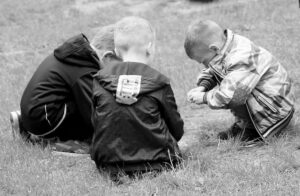Before I start, do you remember hearing these statements during our schooling?
“Why are you crying? Boys don’t cry”
“Stop behaving like a girl”
“You don’t have to cry and be sad for everything”
Learning in school has been a bittersweet experience for most students in India. When it comes to Emotional Learning, it is a whole different story, especially when emotions are involved.
The concept of Emotional Learning in school has been dormant in the education system, especially in India.
How?
- The portrayal of emotions in class has been often looked down upon.
- Certain personal stigmas are repeatedly mentioned to students and teachers.
- Understanding what students go through is at the backseat (literally).
Students are expected to be ‘happy’ at all times, and not have problems, emotionally at least.
Why?
Because, “What will my friends think?” or “What will my teacher think?” or even “I am going to get scolded again, so why bother?”
To remove these stigmas, and promote the importance of emotional learning, Social-Emotional Learning or SEL is what is needed.
What is Social-Emotional Learning?
Social-Emotional Learning is a concept that refers to how students:
- Regulate their emotions
- Communicate with each other
- Understand compassion and empathy to understand the needs of other people
- Build relationships
- Make good decision
Social-Emotional Learning is NOT new. It has been talked about since the times of Plato. However, its awareness increased in the 1990s when the Collaborative for Academic Social and Emotional Learning (CASEL) was founded.
 CASEL was founded as a collaborative effort to bring together educators, psychologists, child well-being advocates, and researchers. CASEL’s advocates spreading the concept and the knowledge of Social-Emotional Learning. And more importantly, implement it in the school curriculum.
CASEL was founded as a collaborative effort to bring together educators, psychologists, child well-being advocates, and researchers. CASEL’s advocates spreading the concept and the knowledge of Social-Emotional Learning. And more importantly, implement it in the school curriculum.
According to the Collaborative, there are 5 primary components of Social-Emotional Learning
- Self-Awareness
- Social Awareness
- Self-Management
- Responsible Decision-Making
- Relationship Skills
How do these core components help?
According to various curriculum developers, these components help to develop brain functions in the child that instill healthy emotions. If you think you wish to talk more about emotional learning and how it can help in your career, Book a Session with us today!
How Does Emotional Learning Help Students in School?
This is where it all gets interesting.
We understood some of the stigmas and issues students face daily. Due to this, we dived into what it is and also, what it consists of.
But how does it help?
Improvement in Academics
With the introduction of Social-Emotional Learning in the curriculum, it has been proved that it helps in students’ overall development. This includes academics as well. Understanding your emotions, processing them and more importantly, acknowledging your peers helps improve academic performance.
Targeted Results For Students
Every student is different. And, every student has their way and time of learning. Emotional learning has proved to help students who have had early-identified problems as well.
The students who find it difficult to cope and interact do benefit from the learning concepts. They were able to lessen problems with their conduct, developed a positive approach to themselves and others, and had fewer outbreaks emotionally. This, in turn, led to better academic performance.
Better Interactions Socially
Teaching and understanding emotional learning in school can help also have better social interactions with your peers and teachers.
 You learn from your parents first and then your teachers. Advocating this branch of learning can help students take a positive approach to communication and behaviour.
You learn from your parents first and then your teachers. Advocating this branch of learning can help students take a positive approach to communication and behaviour.
Understanding Self-Care
Exposing yourself to this type of learning as a part of your school curriculum also helps you to understand self-care.
As a concept, self-care and self-love have been lost among students. Students, with the help of this, can understand other people, how to take care of themselves, and take care of the people around them.
Better Classroom Behaviour
Having a curriculum that includes this type of learning can help students with their classroom behaviour.
With the core concepts being taught, you can manage your stress (yes, students have stress), and stress-induced thoughtS. Apart from this, students also have a higher opinion of themselves with their exposure to the concept.
Lesser Aggressive Behaviour
By being exposed to the core concepts of this learning method such as self-management and self-awareness, students have projected less aggressive behaviour.
Along with this, learning constantly about themselves and their emotions, emotional learning has brought a positive long-term effect for them.
Emotional Learning is barely a part of any curriculum in India today. Even if it is, we often ignore it. But, it should be an essential part of any and every curriculum in the world.
Today, understanding, expressing and processing emotions is the NEED of the HOUR! To know more about this concept, you can always Book a Session with our expert counsellors today!
Aditya is a Marketing Manager at Univariety. He loves writing about anything and everything. With a passion for writing and his vision to help students with their education, he wishes to see a better future for them. Aditya loves sports, reading, and photography.



